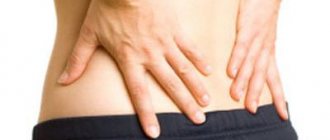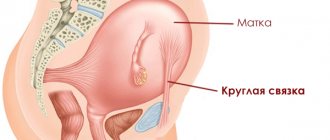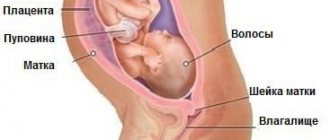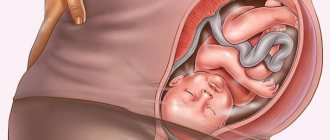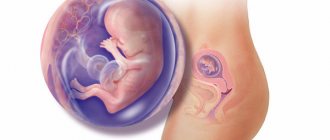When the expectant mother first learns about her new position, she is overwhelmed by many emotions, including fear. She listens to all her sensations and responds to every alarm signal from the body. The same should be done if the uterus hurts during pregnancy. This symptom should not be missed, because normally it should not be present.
A woman should not worry if she feels some tingling or pinching in the uterine area. This indicates implantation of the embryo on its wall. This sensation may occur 6-12 days after conception. Such pain in the uterus in the early stages of pregnancy should not be particularly noticeable.
Is this normal?
During pregnancy, the uterus enlarges and becomes heavier. Due to this, the load on those ligaments that hold it in the pelvis increases. Due to the increase in size, other organs are displaced and the abdominal muscles become tense.
This condition is normal. A woman may experience weak, long-term or short-term strong, as well as stabbing pain in the uterus during pregnancy - they should not cause fear. It is advisable to lie on your side. But if the pain does not go away, you need to consult a gynecologist.
Uterus during pregnancy
How the uterus changes during pregnancy
The uterus plays a dominant role during pregnancy. After all, it is in this organ that the child develops; no other organ, even hypothetically, can serve for these purposes. Just imagine how many times a woman’s uterus enlarges during pregnancy – more than 500! All this is possible due to its unique structure. During the period of bearing a child, the muscle fibers of the uterus lengthen and thicken many times. This happens until mid-pregnancy. In the second half, the growth of the uterus occurs due to the thinning of its walls.
You should talk about how the uterus changes during pregnancy from 5-6 weeks (the period is counted from the first day of the last menstrual cycle), that is, from 1-2 weeks of missed menstruation. Then the uterus gradually takes on a spherical shape (before pregnancy, the organ is pear-shaped). Afterwards the transverse size begins to increase. It should be noted that what the uterus looks like during pregnancy, in its very first weeks, should not be scary. Often, after examination, gynecologists state that the reproductive organ has an asymmetrical shape. But this is the norm. Asymmetry appears in the place where the fertilized egg develops. This is not dangerous, and in the near future, as the child grows, the organ will again become symmetrical.
By 8 weeks, the uterus has increased to 2 times its original size, and by 12 weeks, already 4 times. At the same time, the fundus of the uterus (its upper part) can be felt slightly above the symphysis pubis. Around this time, the doctor begins to measure the length of the uterus using a centimeter tape. By doing this regularly, you can quickly notice a delay in fetal development if such a problem arises. And if at the beginning of pregnancy the length of the reproductive organ is approximately 7 centimeters, then by the end of pregnancy it reaches 37-38 cm. Moreover, closer to childbirth, the uterus may lower slightly, due to the movement of the presenting part of the fetus deeper into the pelvis, but this is, of course, the length of the organ , does not change.
Many mothers wonder when their baby bump will finally become noticeable. As mentioned above, a noticeable enlargement of the uterus occurs from the 12th week. Therefore, those who say that the belly begins to grow from the very first weeks cannot be trusted. This visual enlargement of the tummy is possible due to slight swelling and increased flatulence - a common problem for expectant mothers. At 16-20 weeks, the tummy begins to gently bulge, which is the reason for wearing special trousers with a loose or adjustable belt. From the same period, the doctor may prescribe a bandage if there is a risk of miscarriage or premature birth.
A woman will repeatedly feel hypertonicity of the uterus during pregnancy - this is the norm. The sensation of spasm of the myometrium (muscular layer of the uterus) is a nagging pain. Usually they are localized in a specific part of the organ. In the first weeks, this is the very bottom of the abdomen, and in the third trimester, discomfort may be felt in the area of the fundus of the uterus (at the very top, under the ribs or stomach). Uterine tone during pregnancy is a diagnosis that can be made by a doctor after palpation of the abdomen. On the other hand, such tension in the uterus may be just a reaction to the doctor’s actions. For the same reason, it is not entirely correct to indicate hypertonicity in the conclusion of an ultrasound examination. Passing the sensor over the skin of the abdomen already causes contraction of the myometrial muscles.
In order to correctly assess the risk of miscarriage, it is important to find out what condition the cervix is in during pregnancy, namely, what is its length and density. For reference: the cervix is the part of the reproductive organ that connects it to the vagina. Normally, it is at least 3 cm, the cervix is dense, tilted back and closed (normally it can only allow a finger to pass through in women who have given birth).
Custom search
Did you have a dream? Explain him!
For example: fish
Causes
The uterus is a muscular organ, so increased tone may be normal for it. In the early stages, it occurs due to hormonal changes in the female body. At 6-8 weeks, such pain appears due to the fact that the embryo attaches to the wall of the uterus. This physiological process does not require treatment. In mid-pregnancy, pain occurs due to the strong growth of the uterus. In the third trimester, this condition is a signal of preparation for childbirth. The pain appears sporadically. To stop them, relaxing and taking an antispasmodic is enough.
Sometimes pain in the uterus during pregnancy occurs not because of hormonal changes, but simply as uterine spasms. For example, this can happen after sex or when your bladder is full.
Features of treatment of tooth sensitivity during pregnancy
During pregnancy, it is advisable to avoid the use of drugs, but in difficult situations the risk justifies the benefit for the mother. There are many restrictions when treating teeth during pregnancy, so the dentist must know about the situation and the specific period in order to choose the safest possible care or treatment.
1st trimester
At first, the formation of the child’s internal organs and tissues occurs. This period is accompanied by nausea, dizziness, heartburn and increased salivation, so it can be called the most difficult, but also extremely important.
Oral hygiene is perhaps the only thing available during the first trimester of pregnancy
Doctors prohibit dental treatment from 1 to 13 weeks of pregnancy, without exception. During this period, only regular visits to the dentist for hardware cleaning and simple examinations are available to the mother. Immunomodulators and drugs to strengthen enamel are not used, so women have to save themselves with well-chosen oral care.
2nd trimester
In the second trimester, the fetus continues to develop intensively, while the mother’s condition improves significantly and she is in a pleasant mood. The discomfort goes away and not only preventive methods become available to the woman, but also treatment from 14 to 27 weeks, if required. This will not affect the child's health.
3rd trimester
From the 28th week, doctors do not recommend dental treatment and this process should be postponed until the postpartum period. Treatment is always stressful, albeit small, and the uterus in the third trimester is quite sensitive, so treatment can provoke premature birth. For expectant mothers, the only thing left is prevention.
Types of pain
A woman can usually describe what kind of pain in the uterine area she experiences during pregnancy.
It is worth considering in detail all the varieties:
- stabbing pains may indicate appendicitis and urolithiasis.
- Cutting. Occurs in the early stages. If they are felt on the left or right, this may be ectopic development of the fetus. In some cases, this pain extends to the anus and legs. In the area of the womb, such sensations arise due to interruptions in the functioning of the urinary system.
- Tingling. In the first trimester, they appear due to the preparation of the ligamentous apparatus of the uterus so that the fetus can develop. In this case, the ligaments are stretched. Most often, discomfort is observed in women who experience discomfort during menstruation.
- An aching character localized in the right hypochondrium with irradiation to the lower abdomen manifests itself in the case of an inflammatory process in the gallbladder.
- Cramping pain occurs when there is a threat of miscarriage. You must consult a doctor immediately.
- Pulling can also be a harbinger of interruption. If they are accompanied by bloody discharge, placental abruption can be diagnosed.
- Severe pain at the end of the third trimester indicates the body is preparing for childbirth. At this moment, the pelvic bones diverge, which is why all the unpleasant sensations are concentrated in the area of the sacrum and womb.
- Dull, incessant pain in the navel area, coupled with loose stools, fever and nausea indicate pathologies of the gastrointestinal tract.
- If the uterus hurts as if during menstruation , but already while expecting a baby, this is a signal of the attachment of a fertilized egg to the wall of the uterus. And in the 2nd and 3rd trimester, this indicates a threat of premature birth.
Any pain that continues for a long time and is not relieved by antispasmodics is a reason to urgently call a doctor.
Changes by trimester
First trimester
Many hormonal changes and, as a result, minor changes in the body occur during the first trimester. Some of these include weight changes, heartburn, headaches, frequent urination, constipation, mood swings, taste cravings, morning sickness, breast swelling and tenderness, and extreme fatigue.
Second trimester
Some symptoms, such as fatigue and nausea, will disappear, but in addition to your belly getting bigger, you will notice other changes. These include:
- swelling of the face, fingers, or ankles;
- itching on the legs, palms, or stomach;
- carpal tunnel syndrome;
- darker spots on the skin;
- dark stripe from pubis to navel;
- the skin around the nipples is darker;
- stretch marks on the chest, abdomen, buttocks, thighs;
- pain in the body (hips, groin, stomach or back).
If pain occurs when walking
If a woman feels that her cervix hurts while walking during pregnancy, there is no need to worry. This option is considered normal. Minor discomfort may occur due to the fact that the uterus grows and the muscles stretch. Quiet rest reduces the severity of these symptoms. If the pain is severe and acute, then you should consult a doctor.
Women who have encountered this phenomenon need to independently determine where the pain is more localized. It is enough to place your palm on the abdominal wall and slowly press on the stomach, while determining a specific place. This examination must be carried out in a supine position.
In most cases, expectant mothers experience pain when walking after physical exertion, stress or hypothermia. There is no need to take pills, just calm down and relax. But if the ligaments of the uterus hurt so much during pregnancy that they do not allow you to move, this indicates serious pathologies.
Symptoms of cervical pregnancy
The main problem of the pathology is that it rarely manifests itself.
Even when diagnosed, cervical pregnancy can be interpreted as placenta previa. Therefore, the woman finds out about the problem too late. There are indirect signs of abnormal pregnancy of the cervix. The woman feels that she is “in position.” She feels nauseous, her mood changes frequently, her mammary glands swell and she develops unusual eating habits.
Signs of cervical ectopic pregnancy include a constant urge to urinate. A woman often runs to the toilet as the cervical canal enlarges. If inflammation begins, pain is felt when urinating.
The fertilized egg in the cervical canal provokes discharge. They differ in nature. They can be abundant, weak, observed constantly or once every few days.
If you take a pregnancy test, it will be positive. But with cervical pathology, the level of hCG is low. Therefore, the second stripe will appear weakly.
Cervical pain
While expecting a baby, the cervix takes on its anatomical position. It protects the uterus and appendages from infection. This allows you to more effectively maintain the health of the fetus.
Why does the uterus hurt in the cervical area during pregnancy? Firstly, this may signal hypertonicity. Due to low progesterone levels, such sensations appear. Its deficiency provokes termination of pregnancy. Another reason is an excess amount of prolactin. Often occurs due to nervousness, infection, high physical activity.
Pathological pain
These conditions include problems that are associated with the threat of miscarriage, ectopic and frozen pregnancy, and placental abruption.
Each case should be analyzed separately:
- Threat of interruption. In this case, the woman feels nagging and aching pain in the uterine area. They may be accompanied by bloody discharge. The progress of the process manifests itself in the form of increased pain, a cramping nature is noticeable. Without specific treatment, premature birth or miscarriage may occur.
- An ectopic pregnancy is the attachment of a fertilized egg outside the uterine cavity. The most common variety is the trumpet one. Painful sensations arise on one side, do not last long, but are intense, up to loss of consciousness. At 8-12 weeks, a rupture of the fallopian tube may occur. Diagnosis occurs using ultrasound, and treatment is only surgical.
- Placental abruption. Can happen at any time. The pain is so severe that the woman has to choose a forced position. There may be no vaginal discharge. There are signs of fetal hypoxia and internal bleeding. If this condition is not treated, there is a risk of intrauterine death of the child. In addition, this is a very big threat to a woman’s life.
- Frozen pregnancy. If the process occurred in the first trimester, a woman may not understand whether the uterus hurts during pregnancy. The doctor will see this by the fact that the size of the organ does not correspond to the standard. Nausea and sensitivity to smells may occur, and then the symptoms suddenly disappear. Cramping pain appears in the lower abdomen.
Increased uterine tone during pregnancy. Signs, sensations, treatment of increased tone
Perhaps even those women who have never carried a child under their hearts have heard about the increased tone of the uterus during pregnancy. Unfortunately, this condition occurs so often that it is useful to know about it both for pregnant women and those just about to experience the joys of motherhood. What is increased uterine tone? Why does it appear in early pregnancy or later? Is there any reason to worry and see a doctor? How to recognize signs of increased uterine tone, what sensations does a woman experience with increased tone? And what is the treatment for increased uterine tone during pregnancy? You will know the answers to all these questions at the end of this article.
• What is increased uterine tone?
In order to understand what this condition is, let's first understand what this organ is. The uterus is a muscular organ, hollow inside and capable of contraction; its basis is the myometrium. During pregnancy, it increases in size and stretches. Each muscle fiber of the organ lengthens 10-12 times and thickens 4-5 times.
Nature made sure that during pregnancy, during all 9 months of bearing a child, the muscles of the uterus were in a relaxed, calm state. This is what allows you to carry your baby despite its growing size and pressure. Also, the uterus normally contracts slightly , this happens as it approaches the expected date of birth. Such contractions are called training contractions . They are like a dress rehearsal for the main event - the birth of a baby.
However, it happens that long before childbirth or during a long period of pregnancy (sometimes during the entire period of bearing a child), the muscles of the uterus are in an excited state and periodically contract. At the same time, the muscle layer contracts (the tone of the uterus increases) - the pressure in its cavity increases. Unfortunately, this condition is pathological and requires timely and appropriate treatment, as it is the main symptom of a threatened miscarriage in early pregnancy or the onset of premature birth.
• Symptoms and signs of increased uterine tone
Most often, increased uterine tone during pregnancy occurs in its early stages. Uterine contractions that appear before the due date are called increased uterine tone during pregnancy. The main signs of this condition: nagging, aching pain in the lower abdomen, sometimes cramping spasms (women experience similar sensations during menstruation), pain in the lower back is also possible. It often happens that a woman is not familiar with all these signs of increased uterine tone, but an ultrasound shows increased tone. There are a lot of reasons that can cause uterine tone in the early stages of pregnancy, from banal excitement to underdevelopment of the genital organs of a pregnant woman.
The female uterus is capable of responding to both physical stretching (it grows throughout 9 months along with the fetus) and to nervous impulses, including joy, fear or excitement. Any of the reasons can cause pain in the lower abdomen, and signs of a threatening condition should not be ignored under any circumstances. Your reaction to such pain is to immediately consult a doctor. The specialist will find out the reasons for the increased tone of the uterus during pregnancy and prescribe a course of treatment appropriate to the condition.
If bloody discharge appears from the vagina, call an ambulance immediately. Such discharge is an alarming signal from the body, indicating that a miscarriage or premature birth is possible. Urgent medical attention is also required when a woman in early pregnancy or long before the expected date of birth experiences cramping pain that occurs at intervals of several minutes.
In such cases, the woman should go to the hospital to maintain the pregnancy, under constant medical supervision and in a state of absolute rest until the situation stabilizes or childbirth occurs.
• What sensations does a woman experience with increased uterine tone?
The main sensations with increased uterine tone in a pregnant woman are:
- 1. unpleasant squeezing or aching pain in the lower abdomen (pain with increased tone can be both strong and barely noticeable); often the pain is similar to that characteristic of a woman during menstruation;
- 2. abdominal tension (feelings of hardness, stoneness in the abdomen);
- 3. often – pain or discomfort in the lumbar and sacrum areas.
All these sensations are signs of increased uterine tone, which threatens the normal course of pregnancy. Let us repeat: if the pain becomes cramping and periodic or bleeding appears, call an ambulance immediately!
• How dangerous is uterine hypertonicity? Is it possible not to consult a doctor?
Unfortunately, the consequences of not seeking medical help, or at least consulting a doctor, can be serious. Increased tone can cause spontaneous abortion at any stage. If this happens in the first trimester, in the early stages of pregnancy, they speak of a miscarriage, if in the later stages - of premature birth.
In addition to miscarriage, this condition poses a risk of miscarriage. After all, the circulatory system of the uterus provides the fetus growing under the heart with oxygen and necessary nutrients. With increased uterine tone, their supply is disrupted or periodically stops altogether, threatening fetal hypoxia.
Of course, mild nagging pain in the lower abdomen and lower back is normal during pregnancy, due to stretching of the uterine body. If the pregnant woman is very impressionable, they can be confused with hypertonicity, but even if so, the woman’s excitement in this regard can provoke actual hypertonicity . And even if it is not so significant as to result in such sad consequences described above, then this may not have the best effect on the child’s health. The fact is that with frequent increased tone of the uterus, even if weak, the blood supply to the fetus is disrupted, which provokes oxygen starvation.
• Causes of increased uterine tone during pregnancy
In medical practice, there are two groups of reasons that can provoke increased uterine tone during pregnancy:
- 1. somatic reasons - their occurrence is explained by physiological and biological problems in the body of a pregnant woman;
- 2. reasons of a psychosomatic nature - they are caused by psychological factors (excitement, stress, etc.). Under the influence of such a reason, there is an impact on the nervous system of the pregnant woman and at the same time on individual organs that respond to stimuli - this is how all kinds of complications arise during pregnancy. Similar reasons can cause increased uterine tone in the third trimester.
As a rule, the occurrence of uterine tone is facilitated by overexcitation, nervous stress, fear or overstrain of muscle fibers due to excessive physical activity.
Why and who needs it, is it safe? And what is better, “Duphaston” or “Utrozhestan”?”>reduced production of progesterone, in particular. In the second trimester, increased uterine tone is usually the result of an unhealthy lifestyle or work overload. In addition, the occurrence of increased uterine tone can be a consequence of inflammatory diseases and structural changes (endometriosis, uterine fibroids). The causes of hypertonicity may lie in overstretching of the uterine muscles, which is typical for multiple pregnancies, polyhydramnios, or carrying a large fetus. The causes of increased uterine tone are also the result of a pregnant woman suffering from an acute respiratory infection or another disease (sore throat, flu, pyelonephritis), previous abortions, bad habits (smoking, alcohol, etc.). The occurrence of increased uterine tone in the third trimester of pregnancy often leads to premature birth and the birth of a premature baby.
• Treatment of increased uterine tone
You should report this condition to your obstetrician-gynecologist as soon as possible. The doctor will tell you what to do to reduce the risk of complications, and if necessary, prescribe medication for increased uterine tone in the early stages of pregnancy or in a later period.
“Fortunately, this condition is highly treatable. The very first thing the doctor will require is to normalize the psycho-emotional state and ensure a calm routine for the pregnant woman. Now it is more important than ever for a woman to establish a normal rest and work schedule, adequate sleep, adequate nutrition, feasible physical activity, and regular exposure to the fresh air. Treatment of increased uterine tone often requires bed rest and complete abolition of sexual activity.
— If necessary, the pregnant woman is hospitalized and treated in a hospital. Drug treatment for hypertension can also be used. To ensure psychological calm and relieve stress, sedatives (tincture of valerian and motherwort) may be prescribed. If medications are not effective, Nozepam, Sibazol, Trioxazine and other sedatives approved for use by pregnant women are prescribed.
— To relax the muscles of the uterus, antispasmodics (No-shpa, Papaverine) are prescribed. Magne-B6 may also be prescribed.
— Special drugs that relax the uterine muscles (Ginipral, for example) and calcium channel blockers (Corinfar, Nifedipine) have proven themselves well.
Reach the cervix with your penis
— When the cause of increased tone is a lack of progesterone, hormonal drugs such as Duphaston and Utrozhestan . This treatment for increased uterine tone is prescribed only in the early stages of pregnancy (up to 16 weeks).
- To stop bleeding, hemostatic medications are prescribed (sodium tamsylate, Dicynon).
— When diagnosing increased uterine tone in the later stages, in the third trimester of pregnancy, treatment is prescribed using a dropper. Intravenous administration of a 25% solution of magnesia sulfate and 10% alcohol alleviates an acute situation.
- In addition to the above treatment, a fortified diet, psychotherapy, physical and acupuncture therapy are used.
— In case of sudden onset of spasms, which manifest themselves very strongly, you can relieve the pain by taking 2 tablets of No-Shpa or placing a suppository with Papaverine. In this case, the next step should be an urgent visit to an obstetrician-gynecologist. Even if the pain has passed, you cannot ignore this incident and ignore a visit to the antenatal clinic with the doctor leading your pregnancy.
Remember: the health and life of your unborn child directly depends on how you behave.
What to do?
It is important to remember that in normal conditions the cervix hurts during pregnancy calmly and unobtrusively. If the sensations become unbearable, acute and frequent, accompanied by bleeding, you should immediately contact your doctor.
If your ligaments hurt, rest will help relieve the discomfort. You can try taking a knee-elbow position to unload the spine. Another good method is to place one pillow under your stomach and squeeze the other between your legs. Taking a warm shower will also relieve symptoms.
The characteristic pain at the beginning of pregnancy quickly passes. The main thing is to be patient and visit your gynecologist regularly. If you follow all his recommendations, you will be able to maintain good health.
Author: Irina Levchenko, doctor, especially for Mama66.ru
If pain in the uterus appears during pregnancy, this should alert any woman. Their appearance is extremely undesirable - there is no doubt about it. However, in the early stages, slight tingling is possible. Why and where do they come from? The fact is that the ligaments of the uterus stretch, preparing for the growth of the fetus, which causes mild stabbing pain.
A woman may feel mild discomfort 7-8 days after conception. The fact is that fertilization of the egg occurs in the fallopian tubes. After this, the embryo gradually moves towards the uterus. Implantation (that is, attachment of the embryo to the endometrium) occurs after about a week. It is the penetration of the fertilized egg into the mucous membrane that causes mild stabbing pain in the early stages.
Pain as a sign of ectopic pregnancy
Sometimes painful sensations in the early stages may indicate an ectopic pregnancy. Normally, a fertilized egg should attach to the wall of the uterus. However, there are cases when it does not reach it and is attached to the lumen of the fallopian tube. In this case, they talk about tubal pregnancy.
If the egg reaches the uterus, but for some reason bypasses its bottom and walls, and the cervix becomes the site of implantation, then a cervical pregnancy has occurred. When examined in the mirrors, an enlarged cervix is visible. Both cases are very dangerous and can cause serious complications, including rupture of the fallopian tube and peritonitis.
An ectopic pregnancy is indicated by:
- cutting or stabbing pain to the right or left of the uterus;
- general weakness;
- dizziness;
- nausea;
- the appearance of bloody or brown discharge.
If you have an ectopic pregnancy, you should go to the hospital immediately. In this case, surgery may be required.
Treatment of cervical pregnancy
If a problem is detected, the woman is immediately hospitalized.
Treatment can be radical and organ-preserving. The choice of method depends on the patient's condition. If the pregnancy on the cervix is advanced and complicated, the uterus is removed. In other cases, conservative therapy or minimally invasive intervention is performed. The latter option will allow the woman to subsequently give birth to a child.
In case of cervical pregnancy, heavy bleeding must first be stopped. After this, medications are administered that are toxic to the fertilized egg and stop cell division.
To preserve a woman’s cervix and uterus, uterine vessels are blocked, hysteroresectoscopy of the implantation site is performed, and the fertilized egg is removed with a laser. Another modern method of therapy is vacuum aspiration. Gynecologists remove the embryo from the cervix with a special instrument, then install a drainage to stop the bleeding.
Methotrexate in early pregnancy
Methotrexate therapy
Until recently, doctors believed that in the presence of cervical pregnancy, ectopic (ectopic) conception should be treated by laparoscopy. But today there is an alternative to surgery. Methotrexate injections are often used.
Treatment should only occur under the supervision of a gynecologist. This drug should not be administered in the last trimester. It is used in early pregnancy, if the fallopian tubes are intact.
The medicine is injected in small doses directly into the fertilized egg. If a multiple dosage regimen is chosen, calcium folinate is prescribed in parallel. This drug eliminates the negative effects of Methotrexate.
There are three treatment options. Methotrexate can be administered once, twice, or several times. It all depends on the woman’s health and complications of cervical pregnancy.
Nature of pain in the uterus
The localization, strength and nature of the pain will help determine whether there is a danger to the woman and the fetus. Indeed, in some cases, spontaneous miscarriage, ectopic pregnancy, or even diseases of organs located near the uterus are possible. In this case, immediate treatment is necessary.
Early nagging pain
If they occur in the early stages and are accompanied by bloody discharge, this indicates a threat of miscarriage.
A nagging pain in the later stages may indicate placental abruption. This is a sign of serious danger for both the pregnant woman and the baby.
Stitching pains
In women who have suffered from painful periods, mild stabbing pains usually indicate that the round ligaments of the uterus are being stretched.
Severe and sharp stabbing pains often indicate the appearance of other diseases - urolithiasis or acute appendicitis.
Cutting pains
In the early stages, they are often a sign of ectopic pregnancy. More often they appear on the right or left side, radiating to the anus.
So if your uterus hurts during pregnancy, it is best to consult a doctor. He will be able to check whether it is dangerous and whether complications should be feared. In addition, abdominal pain in early or late stages sometimes occurs due to diseases of the gastrointestinal tract or other diseases.
Sensations in the early stages of an “interesting” situation
Of course, the most telling symptom of pregnancy is the absence of regular periods. However, this is not an indicator that will help you find out about conception right away. For example, the woman had no thoughts of becoming a mother, and the menstrual cycle schedule did not occupy her much attention. In this case, the first guesses that she may be pregnant will come to her no earlier than 2 or even 3 weeks after the implantation of the fertilized egg into the wall of the uterus.
The situation is completely different for women who have planned a pregnancy. They are attentive to any metamorphosis of their body, so they can unmistakably understand that their dream has come true. Possessing a high degree of responsibility and attentiveness, some ladies even feel how a fertilized egg is implanted into the uterine cavity.
So, what should you pay attention to first? Let's list the most indicative signs of pregnancy.
Change in basal temperature
When planning a pregnancy, women measure their basal temperature every morning to determine when ovulation will occur. When the egg is fertilized, a decrease in temperature occurs - this is facilitated by a sharp jump in estrogen in the blood. After fertilization, the basal temperature rises sharply, which is caused by the intense production of progesterone in the body. Reducing basal temperature is a short-term process and lasts only one day. An abrupt change in its indicators is considered the earliest sign of pregnancy.
Scanty bleeding
This usually happens 7 to 12 days after fertilization of the egg. Discharge appears when the fertilized egg implants in the uterine cavity. If a woman has not yet thought about motherhood, she mistakes spotting for the beginning of the menstrual cycle or late menstruation. However, we should not forget that the attachment of the embryo very often occurs without the release of the ichor from the genital tract.
Malaise
Unpleasant sensations in the early stages of pregnancy can be considered a pattern. At the very beginning of the long nine months, expectant mothers are often visited by weakness, drowsiness, and constant fatigue. After fertilization, the female body’s immunity weakens somewhat - this is a natural process that ensures the successful development of the embryo and its transformation into a full-fledged child. At this time, the body temperature of the expectant mother increases very slightly, but this undoubtedly affects her well-being. The feeling of apathy and high fatigue in early pregnancy is caused by the active production of progesterone in the body. When pregnant with twins, the sensations in the early stages are even more pronounced: expectant mothers may feel exhausted and literally sleep on the go.
Increased breast sensitivity
In the vast majority of women who have become pregnant but do not yet know about it, their mammary glands “hint” at their delicate situation. They become very sensitive, become rude, and react painfully to touch. The reason lies in a thorough restructuring of the hormonal system with the onset of pregnancy. Sometimes everything happens exactly the opposite - the breasts, which gave a woman painful discomfort before each period, become less sensitive and no longer hurt. As a rule, soon after this the woman finds out that she is expecting a child.
"Heavy" uterus
Sensations in the uterus in the early stages of pregnancy are also specific. The range of sensations is very diverse: from a pressing feeling of heaviness to a slight tingling sensation. A woman begins to feel the uterus after implantation of the fertilized egg into the uterine wall.
Toxicosis
The sensations caused by toxicosis are so specific that they are almost impossible to confuse with an ailment of another nature. Morning sickness, which sometimes ends with vomiting, a radical change in gastronomic preferences, dizziness, fainting - you must agree, all these “innovations” should immediately make a woman think about pregnancy.
Other causes of abdominal pain
Sometimes pain, cramps or discomfort appear for reasons that have nothing to do with pregnancy. Despite the fact that the stomach hurts in the area of the uterus, the cause must be looked for in a completely different way.
- Diseases of the digestive system - hepatitis, pancreatitis, cholelithiasis, intestinal obstruction, dysbacteriosis, food poisoning.
- Diseases of the genitourinary system – cystitis, pyelonephritis or other infections.
- Sometimes there is pain in the lower back. They radiate to the stomach, simulating uterine pain.
- Pregnant women may also develop preeclampsia of varying severity.
- Risk factors include high blood pressure, obesity, and kidney disease.
- Characteristic symptoms of preeclampsia include swelling, high blood pressure and protein in the urine. This pathology is very dangerous and difficult to treat.
When pain is not dangerous
The uterus is an organ made entirely of muscles. Its main parts are the bottom, body and neck. In the pelvic cavity, this organ is held in place by ligaments. The main ones are the wide, round ligaments of the uterus, as well as the ligaments that support the ovaries. While the muscles adapt easily during fetal growth, the ligaments stretch with great difficulty. They are less elastic, which is why stretching them causes mild stabbing pain.
Sometimes the cause of pain can be a violation of the tone of the uterus - hypertonicity. Normally, it should not be there, because progesterone (a hormone that is intensely produced during pregnancy) promotes muscle relaxation. If it is not enough, uterine contractions are possible. Sometimes this leads to miscarriage.
However, there are often spasms and cutting pains that are not associated with impaired progesterone secretion and hypertonicity. The body, fundus, and cervix are subjected to spasm. The most common cause is a full bladder or recent sexual intercourse. This is practically harmless, but such situations should still be avoided.
How to get rid of pain
First of all, cramps should not be allowed to appear - they can harm the mother or baby, lead to unauthorized termination of pregnancy or premature birth. Therefore, the fundus, walls and cervix should be relaxed. So you need to avoid active sexual intercourse, prevent the bladder from overflowing, and do not overwork. If pain does appear, you need to do the following:
- sit in a comfortable position;
- straighten your legs and lift them up;
- try to relax;
- for spastic pain, you can apply a heating pad (this must be done very carefully).
When the attack passes, it is best to go to the hospital. This is especially necessary if the pain is very severe, appears regularly, and causes a lot of discomfort.
A woman's condition during pregnancy changes in unpredictable ways. Pregnant girls may experience many unusual sensations, and quite often pregnant women experience pain in the lower abdomen. Don’t be scared or panic, this will only worsen the condition of the expectant mother and baby.
It is worth remembering that in most cases this condition is physiological in nature and does not pose a danger. But sometimes such pain can warn of the development of pathologies during pregnancy, so a young mother should know all the intricacies of this unpleasant sensation. And it is very important not to hide this condition from the specialist who is managing the pregnancy, since it can indicate very serious disorders and even indicate the possibility of losing the child.
Firstly, there are different types of pain, and secondly, the week of pregnancy in which the girl encountered this sensation is important. This is what the doctor evaluates during consultation in cases of such complaints.
The “why” period
Many women, including those who have been desperate to become pregnant, may feel some anxiety at the thought of pregnancy, childbirth, and then motherhood. Doubt and uncertainty make up a large part of the waiting period.
Having a baby is a step into the unknown, and it can be scary, especially if it's your first child. Therefore, it is okay to ask questions.
“Will the birth go well?”
Childbirth, as a special event, is one of the sources of anxiety. “How will they go? Will it hurt me? How effective is epidural anesthesia? Will I be able to carry a child?” You may be dreading your due date, even if you've been feeling impatient in recent months.
Moreover, this fear affects not only you. Fear appears for the child - you are afraid that something serious may happen to him.
Worries are heightened if you have had a miscarriage or unsuccessful pregnancy in the past. You need to tell yourself that everything happens differently every time. Even if the doctor warned you that there is a risk, this does not mean that the problem will appear this time. On the contrary, thanks to preventive measures, in some cases the risk can be avoided.
“Will I be able to rise to the occasion?”
Women expecting their first child often have questions about their new situation. Sometimes a woman doubts herself: “Will I be able to establish contact with my child? Will I love him? How can I understand him? In reality, you doubt your ability to become a mother because you have never encountered such a situation and do not know what you are capable of. Most expectant mothers have asked themselves these questions, and their subsequent experience shows that abilities manifest themselves as soon as the baby is born and as soon as they begin to care for him.
“Do I have enough financial resources to raise my child?”
Financial problems are often a source of anxiety. If your own family has a modest income, then you will most likely have to combine work and child care, which is why you are unlikely to be able to fully meet the child's needs. Money can be one of the decisive factors determining your future life with your child.
“How will my life change?”
Women, especially young women, cannot fully get used to the idea that being a mother entails deprivation or at least changes in your life. It happens that the expectant mother is afraid that the child will monopolize all her time and attention, that he will interfere with her professional ambitions, that he will disrupt her relationship with her partner. The perceived need to come to terms with a new role can cause hidden stress. But as soon as the child appears, the mother does not experience the slightest sense of loss. Gradually her life is changing: now she is not only a wife, but also a mother, and over time she will get used to the new rhythm.
For every woman, pregnancy is a period of very intense inner life.
When lower abdominal pain is a safe symptom
Since from the very beginning of conceiving a baby, many changes that are imperceptible at first glance occur in a woman’s body, painful sensations may be observed, which should not be considered a pathology.
Thus, the body simply signals an unusual state.
Harmless causes of pain may include the following:
- In the early stages, this sensation may be a sign that a fertilized egg is implanting into the uterine tissue. This process is called implantation of the fertilized egg, and after a few days the pain goes away.
- Unstable functioning of the digestive system due to pregnancy. In this case, the girl often experiences a feeling of bloating in the abdomen and difficulty defecating (constipation). The consistency and color of the stool also changes. These symptoms also go away without treatment after the body gets used to the presence of the embryo.
- At the end of the first trimester, the uterus becomes larger and changes its location. This provokes pain. Stretching of muscle tissue can cause this condition.
- Increased production of the hormone progesterone, which helps with the formation of the birth canal during pregnancy, can also trigger abdominal pain because it makes ligaments and joints more elastic. The action of the hormone also extends to the uterus, which causes characteristic pain.
- At a later stage of pregnancy, somewhere in the third trimester, the cause of this phenomenon may be kicks from the baby's legs or arms. When the baby has grown up, his movements can cause pain if he sharply presses on any internal organ. This happens especially often when the mother’s bladder is full.
Only a specialist, after examination and examination, can affirmatively say that the cause is harmless. A woman should not wait and hope that everything will go away by itself. By remaining silent at the first signs of violations, you can provoke a lot of complications that are unsafe for the health of mother and child. Therefore, it is better to immediately tell the doctor about the unpleasant sensations than to ignore the problems and bring the situation to a critical one.
Abdominal pain during pregnancy as a signal of the development of pathologies
Carrying a baby is a rather long and difficult process for any woman’s body. And, unfortunately, not everyone goes through it without pain and various deviations. If a pregnant woman has pain in the lower abdomen, then you should immediately evaluate the possibility of such disorders as:
- Uterine hypertonicity is the most common cause. This condition is quite dangerous and requires medical monitoring and treatment. The uterus becomes inelastic, which makes it difficult for the baby to fit properly in the womb and can lead to miscarriage. Abdominal pain in this case is also accompanied by nagging pain in the lumbar region.
- Frozen pregnancy, when the baby loses viability while still in the womb. Often in this case, there is an increase in body temperature, nausea and vomiting, and the symptoms that accompany pregnancy disappear.
- An ectopic pregnancy is also accompanied by pain in the lower abdomen. This means that the embryo does not develop within the uterus and in the tubes. If you do not consult a doctor in a timely manner, this can lead to rupture of the tubes, which has quite serious consequences for the woman’s body and can greatly complicate further attempts to become pregnant.
Signs of pregnancy
The most common sign of pregnancy is morning sickness. However, the first signs of pregnancy manifest themselves in different ways:
- Lack of menstruation. Depending on the characteristics of the body, their absence may occur throughout pregnancy. Less commonly, it can be caused by taking medications or breastfeeding.
- Vomiting and nausea. Duration from 2 to 8 weeks. This signal also indicates that the body is poisoned or has an infection.
- Frequent urination. This condition may also indicate that there is an infection in the urinary tract.
- Breast swelling. The process of change begins from the first days of pregnancy.
- Changes in the vaginal mucosa. Occurs in 1-3 months of pregnancy or when menstruation approaches.
- Increased appetite. It may also be due to hormonal imbalance.
Due to the peculiarities of the female body, intoxication and other signs may not appear immediately, but at 4 weeks of pregnancy. If your morning nausea becomes more frequent, you should consult a doctor. This sign may not only indicate the presence of pregnancy.
The time of 4-6 weeks is the beginning of physiological changes in the female body. There is severe vaginal discharge or an increase in basal temperature. Frequent urination begins to bother the pregnant woman.
When the nipples swell, the breasts become sensitive. Sensitivity throughout the body is less common. The presence of such symptoms is associated with the rhythm of life and the physiology of the female body. Abdominal enlargement may begin at 5-6 months.
During the 6th to 12th week after intimacy, bleeding may appear. This is due to the fact that the process of implantation of a fertilized egg is underway. The discharge has a color characteristic of menstruation, so a woman may at first decide that menstruation has not started according to schedule.
We also recommend reading: First symptoms of pregnancy
If such bleeding becomes more frequent after a delay, you should consult a specialist. Pregnancy accompanied by such signs indicates a threat of miscarriage. Therefore, additional examination is simply necessary.
Change in basal temperature
When planning to conceive a child is carried out with the measurement of basal temperature, then the likelihood of determining conception before the delay increases. The first signs of pregnancy in the early stages are almost the same for all women, only they differ in the degree of their manifestation.
We recommend reading: Chickenpox during pregnancy, When breasts begin to grow during pregnancy, Vitamins during pregnancy
When the basal temperature changes to 37 degrees, a woman can be sure that she is pregnant. In the case of intimacy, fertilization may not occur, then the temperature drops. At conception, it increases again and remains so for a long time.
Basal temperature is checked by insertion into the vagina or rectum. To ensure accurate data, you need to measure your temperature early in the morning while lying down.
Basal temperature can be changed when changes occur in a woman's hormonal levels. The release of progesterone increases the temperature.
Implantation retraction
The surest sign of pregnancy is the presence of changes in the basal temperature measurement schedule. The essence of implantation retraction is a sharp drop and rise in temperature. This process is associated with the production of the same progesterone. And the release of estrogen into the body lowers the temperature.
Therefore, sudden changes in temperature can be observed after conception.
What happens in the lower abdomen
During pregnancy, blood flows into the pelvic area as the uterus begins to grow. Most often, a woman feels strange changes in the lower abdomen, similar to “fullness.” Sometimes swelling of the legs occurs due to weight gain.
Sensations in the lower abdomen are the main sign of pregnancy. If a woman knows her body well, then in 1-2 weeks she will be able to feel her uterus. Sometimes these changes lead to severe irritability.
Sexual desire during pregnancy
During pregnancy, hormonal changes occur in the female body, so sexual desire may disappear or become particularly pronounced.
During the entire period of pregnancy, the appearance and disappearance of sexual desire may alternate. There are no special contraindications for continuing intimate life, since this will not harm the fetus, with the exception of the threat of miscarriage after the examination.
Sleep disturbance
The absence of a menstrual cycle does not mean that a woman is pregnant. Most often, symptoms appear in combination. The most striking manifestation is the presence of restless sleep or insomnia. It comes long before the delay.
Some women, unaware of their situation, feel tired and need to go to bed earlier. They fall asleep quickly, but in the morning they wake up early and cannot fall back to sleep. This condition is a little depressing, but by the evening pregnant women calm down.
We also recommend reading: How to lose weight during pregnancy
There are times when, on the contrary, you simply cannot fall asleep, you need to spend about an hour to find a comfortable sleeping position and get a restful sleep.
Tingling in the uterus
Not all women experience tingling in the uterus; there are cases when pregnancy proceeds quite calmly and without visible changes. A sign of conception is a tingling sensation in the uterus, which indicates that it is beginning to enlarge.
In the first weeks, the increase will not be so noticeable, so tingling indicates that blood flow in the pelvic organs is increasing. The pain may be moderate or increasing.
The intensity of the pain syndrome depends on the location of the mature egg. Therefore, colic can occur on both the left and right sides. This sign is considered the most important and reliable among all the others.
Colic in the lower abdomen
There are cases when conception is confused with menstruation, since pain is accompanied by the same symptoms. However, in the early stages, menstruation may occur.
Mild colic can accompany the entire pregnancy. If such sensations appear, you should consult a doctor to establish an accurate diagnosis. Such manifestations can be associated not only with pregnancy, that is, there are problems in the body.
Lower back pain
Tingling in the lumbar region in any position indicates pregnancy. The pain intensifies with movement. When a woman sits or lies, the colic is tolerable.
The gestation period may be accompanied by lumbar colic. This condition manifests itself even before the delay of menstruation.
Smells
The very first signs of pregnancy are not only an increase in basalt temperature, nausea and nervousness. Aversion to odors is the main sign of conception. A woman begins to be irritated by too strong, sweet smells. Any change in them entails nervousness.
Previously pleasant odors may become unacceptable throughout pregnancy. A woman reacts with hostility not only to the smell of perfume or cosmetics; the aroma of food or household chemicals also causes irritation. If the smell is too strong, it may cause fainting.
Taste
Taste sensations may remain the same, or they may change radically. Already in the second week, a woman feels that her taste priorities begin to change. Everything that previously seemed tasty to her is now extremely unpleasant.
Sometimes there is a desire to eat salty and sweet or sour and spicy. One gets the impression that the woman lacks some specific taste.
Bloating
When the hormone progesterone is produced in the body, complete relaxation occurs, which affects the muscles and the condition of the internal organs. This condition is necessary so that the uterus also relaxes, otherwise the life of the child is endangered and the likelihood of miscarriage increases.
We also recommend reading: Low blood pressure during pregnancy
To prevent pregnancy from causing discomfort, the doctor prescribes a special diet. Then food will not affect the woman’s condition in any way.
Urination
The amount of female hormones increases, blood flows to the pelvic area, so the kidneys change their mode of operation. Therefore, frequent urination is observed. As the baby grows in the uterus, pressure on the bladder increases over time.
Vaginal discharge
An increase in the amount of discharge indicates that the pelvic organs are filled with blood. To prevent germs from entering and spreading throughout the body, the discharge is protected at the entrance to the vagina.
This environment is favorable for yeast fungi. Therefore, in order to avoid getting thrush, you need to undergo treatment, otherwise the child can become infected through the birth canal.
Fainting
During pregnancy, there is a decrease in blood pressure, which leads to weakness and fainting. Severe headaches may bother you, which will subsequently cause weakness of the whole body.
A stuffy room is not acceptable for a pregnant woman, as it can lead to tinnitus and sudden fainting. Taking hot baths is also not advisable due to health problems.
Appetite
An increase in the amount of food consumed is a signal for pregnancy. The woman begins to eat in large quantities. Even in the early stages he begins to experiment with mixing flavors.
You may develop cravings for certain foods or a group of foods. Previously favorite food becomes unacceptable, strong odors become irritating.
Exacerbation of chronic diseases
In the first stages of pregnancy, a woman’s immunity decreases so that the body does not reject the embryo. This can cause exacerbation of chronic diseases. Also, this phenomenon can arise as a result of increased load on all organs and systems, since during this period a woman needs to cope with the vital functions of two organisms.
However, the intensity and type of pain can be very diverse. Despite the fact that these conditions do not directly affect a girl’s ability to bear a child, they can indirectly cause a disruption in the baby’s development or a sharp deterioration in the mother’s condition and her inability to fully spend the period of pregnancy and childbirth.
Diseases that can cause abdominal pain during pregnancy include:
- Cholecystitis is a disease of the gallbladder, which is accompanied by sharp pain in the right side of the abdomen. The girl’s body temperature also rises sharply and vomits. In addition, bitterness in the mouth may occur.
- Gastritis can also worsen during pregnancy, since compression of the stomach during the birth of a new life in the uterus can make it difficult to remove gastric juice, which provokes a relapse of the disease. In this case, in most situations the pain spreads in the upper part of the abdomen, and only sometimes it is transferred to the lower part.
- Pyelonephritis, inflammation in the kidneys, often occurs due to the fact that it is difficult to remove metabolic products from the organs. The condition is characterized by aching pain, as during menstruation, which radiates to the lower back. Inflammation can go away without an increase in temperature, but simple tests will immediately show the presence of this pathology.
- Cystitis is a disease of the bladder, dangerous due to the spread of infection through the reproductive tract, which can lead harmful microorganisms directly to the child. This disease is accompanied by painful and frequent urination. There may also be blood in the urine.
- Acute appendicitis. The situation arises when an organ is inflamed, requiring urgent medical attention, often surgical intervention. In a woman, such an illness is accompanied by a prolonged attack of pain, which changes in intensity, while the temperature rises and vomiting begins.
All these diseases are considered serious and dangerous for both the mother and the baby. They require serious, attentive therapy, which is mainly carried out in a hospital. Doctors often have to use quite strong drugs to preserve a woman’s ability to carry a baby. But you should not hope that you will be able to recover from these diseases on your own.
Without the attention of a doctor, illnesses will develop and provoke new deviations.
When carrying a baby, the proper functioning of each organ is important, so it is necessary to monitor the general state of health. When preparing for pregnancy, a woman needs to undergo a quality examination and, if possible, solve health problems.
Tips for relief
These tips can only be used after consultation with a doctor and a clear understanding that there are no pathologies or chronic diseases, since if there are any, the doctor prescribes a specific treatment and gives specific recommendations on nutrition and lifestyle. In some cases, for example, it is necessary to minimize movements throughout pregnancy and follow a strict diet in order not to provoke an exacerbation of diseases.
But if abdominal pain appears due to non-dangerous physiological reasons, then you should remember several important recommendations:
- Don't overeat.
- You need to spend at least 4 hours a day outside.
- It is important not to forget about measured walking in the morning and evening.
- You need to eat light foods that reduce the load on the digestive organs, kidneys and liver.
- You should not take any medications, even vitamin complexes, without a doctor’s prescription.
All this will help strengthen the body and give it the resources to cope with such a difficult task as bearing a child. If there are no pathological factors underlying the pain, it will go away within a few weeks.
After giving birth, a woman will be able to completely forget about these unpleasant sensations. The main thing is to closely monitor your health and changes in your body. It’s worth listening to your body, and it will tell you what disorders it has. Modern gynecology and obstetrics, in turn, have a large arsenal of tools to make pregnancy as comfortable and painless as possible.
